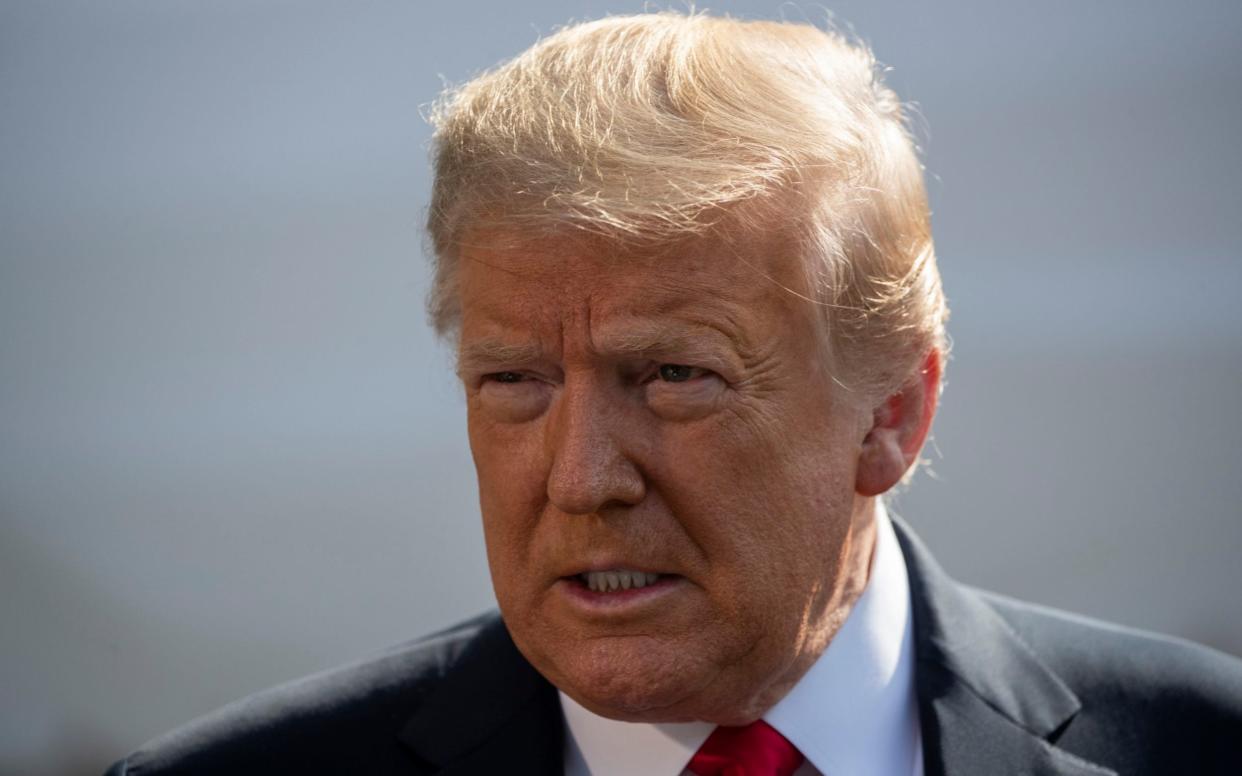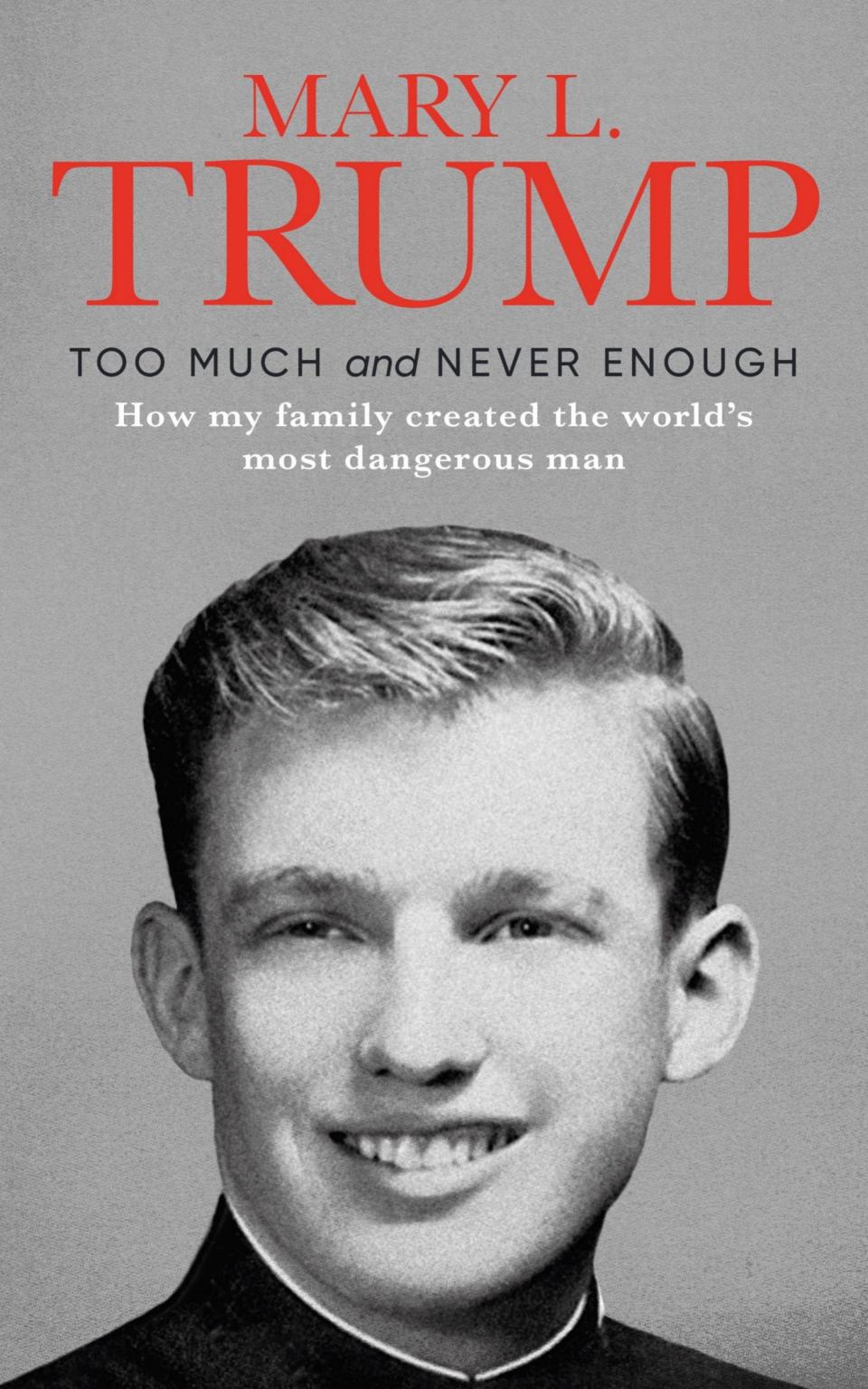Donald Trump cheated on exams to get into university, claims his niece in new 'tell-all' book

The White House has been forced to deny claims made by Donald Trump’s niece in her upcoming book that the US president cheated on exams that helped him win a place at university.
Mary Trump alleges in her book - copies of which were leaked ahead of its official release next week - that her uncle paid someone to take his SATs for him so he could get into Wharton School of Business at the University of Pennsylvania in the mid-Sixties.
Ms Trump says the book, Too Much and Never Enough: How My Family Created the World's Most Dangerous Man, is based on her own memory, and in parts she reconstructed some dialogue based on what she was told by some members of the family.
She writes that Mr Trump, then a high school student in Queens, New York, enlisted "a smart kid with a reputation for being a good test taker, to take his SATs for him". Mr Trump initially attended Fordham University in New York as an undergraduate before transferring to Wharton.
“Donald, who never lacked for funds, paid his buddy well," Ms Trump alleges in the book.

“The absurd SAT allegation is completely false,” Sarah Matthews, deputy White House Press Secretary, said in a statement.
Ms Trump’s book is the second tell-all in as many months to present a withering portrait of the president, however, hers concentrates on the little-known earlier parts of the president's life before he took office.
The book details a destructive relationship with his father, quarrelling with his siblings and alleged character flaws.
Copies of the book by Ms Trump, the daughter of the US president’s late older brother, were obtained and reported on by The New York Times, The Washington Post and CNN on Tuesday, revealing the critical account of family feuding.
Ms Trump claims that Mr Trump’s upbringing under his domineering father Fred Trump, a New York property magnate, undermined his “ability to develop and experience the entire spectrum of human emotion”.
She says that the future president delighted in hiding his younger brother Robert’s toys, including a set of Tonka trucks given for Christmas, later threatening to break them if his brother did not stop crying.
“Donald’s ego has been and is a fragile and inadequate barrier between him and the real world, which, thanks to his father’s money and power, he never had to negotiate by himself,” Ms Trump writes at one point.

Ms Matthews at the White House said: “'The President describes the relationship he had with his father as warm and said his father was very good to him. He said his father was loving and not at all hard on him as a child.”
She claimed that the book "is clearly in the author's own financial self-interest."
However the president is expected to strongly push back on the claims, as he has against a string of recent critical books published about his presidency from insiders.
It should also be noted Ms Trump was not alive during her uncle's childhood, the dynamics of which she describes.
The Trump family is attempting to stop publication of the book, whose release date has been pulled forward to July 14, by claiming that Ms Trump is breaking a nondisclosure agreement by writing about her relatives. Yet Simon & Schuster plans to push ahead with publication.
Ms Trump, 55, is daughter of Fred Trump Jr, the US president’s oldest brother who died after problems with drinking three decades ago. She also has a doctoral degree in clinical psychology.

Her account, the first to emerge from within the Trump family since Mr Trump won the presidential election in November 2016, details alleged tensions between relatives and makes claims about the impact they had on her uncle.
Much emphasis is put on how Mr Trump and his older brother Fred Jr were treated by their father, Fred Trump, who is portrayed as a heavy-handed parent focussed on succeeding in business.
“By limiting Donald’s access to his own feelings and rendering many of them unacceptable, Fred perverted his son’s perception of the world and damaged his ability to live in it,” Ms Trump writes at one point, according to The Washington Post.
At another she claims that for the future president “lying was primarily a mode of self-aggrandisement meant to convince other people he was better than he actually was”.
She also alleges that during his childhood Mr Trump learned “twisted behaviors”, such as to see people in “monetary terms” and practicing “cheating as a way of life".
According to The New York Times, the book quotes Mr Trump’s sister Maryanne calling him a “clown” during a lunch in 2015 where she reportedly predicts he will "never" become US president.
At another point his sister Maryanne is quoted speaking in disbelief at Mr Trump leaning on his Christianity while wooing evangelical voters, saying: “The only time Donald went to church was when the cameras were there.”
The book also claims that the family sent Fred Jr, Mr Trump's older brother, to the hospital alone the night he died. Mr Trump, the future president, went to see a movie, the book alleges according to The New York Times.
Ms Trump, a clinical psychologist, also asserts that the US president is a narcissist. The New York Times quotes her at another point writing: “Donald has been institutionalised for most of his adult life, so there is no way to know how he would thrive, or even survive, on his own in the real world.”
At one point Ms Trump explains why she decided to speak out. CNN reports she writes: "Donald, following the lead of my grandfather and with the complicity, silence and inaction of his siblings, destroyed my father. I can't let him destroy my country."
Ms Trump goes on to detail a string of other unflattering alleged anecdotes about Mr Trump, the uncle who she claims would call her “honeybunch” when she was young.
She recalled that when playing baseball with younger relatives Mr Trump “saw no reason to throw the ball any more gently” even if the others playing were aged six or nine.
Ms Trump described once catching a ball thrown by Mr Trump that created such a loud noise when it hit her leather glove that it “reverberated off the brick retaining wall like a shot”.
She alleges that Mr Trump adopted his father’s critical attitude towards Fred Jr, Ms Trump’s father, likening his ambition to be a pilot derisively to being a bus driver in the sky.
Ms Trump says she was once hired by Mr Trump to help him complete one of his books on business but he repeatedly failed to carve out time for an interview and she eventually left.
She recounts her major falling out with the wider Trump family, when Ms Trump alleged she and her brother had been written out of getting their father’s share of their grandfather’s fortunes when he died.
The row, which has been previously reported, led to a standoff and was eventually settled out of court. Ms Trump says she did not speak to some family members for years afterwards.
She also reveals that she played a critical part in The New York Times’s investigation into the president’s financial situation which led to the paper winning a Pulitzer Prize.
Ms Trump describes how she agreed to hand over financial documents to reporters after the 2016 election having become disillusioned with her uncle’s approach to the presidency.
The paper’s reporting claimed Mr Trump inherited hundreds of millions of dollars from his father, undercutting his self-made billionaire image. Mr Trump vehemently denied the claims.
Near the end of the book, Ms Trump sums up how she believes Mr Trump’s upbringing and family dynamics shaped the man he has become.
“Every time you hear Donald talking about how something is the greatest, the best, the biggest, the most tremendous, (the implication being that he made them so), you have to remember the man speaking is still, in essential ways, the same little boy,” she writes.
“At a very deep level, his bragging and false bravado are not directed at the audience in front of him but at this audience of one: his long-dead father”.

